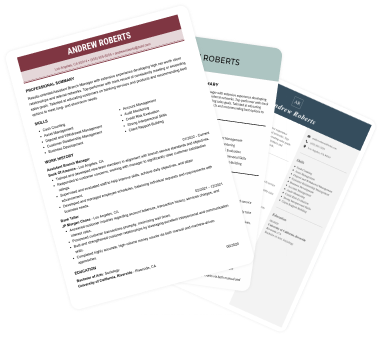Create a professional CV now!
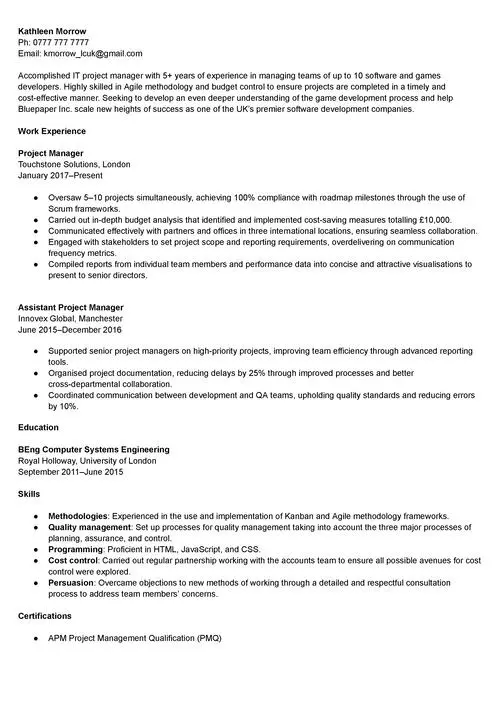 NO
NO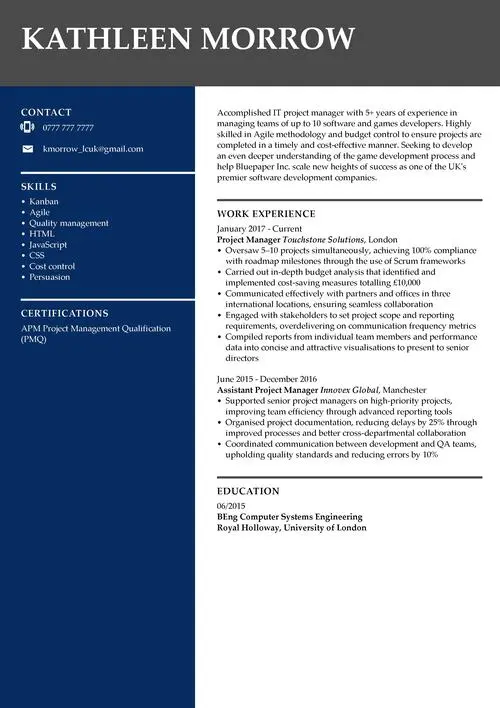 YES
YESLast updated on 4 February, 2026
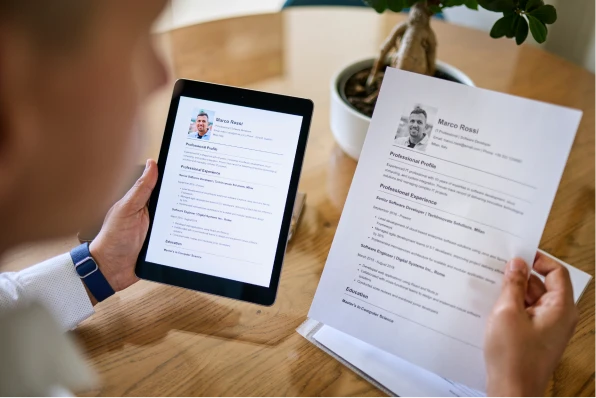
Our customers have been hired by*:
You can’t write a CV without including skills. They’re proof that you have the necessary qualifications to do the job. But how do you choose the best skills to add to your CV? And which skills can actually be considered “the best”?
Rest assured: I’ll guide you through the process and offer insights into different skill types. I’ll also show you the 10 best skills according to various research, along with how to add them to your CV.
Create an effective CV in minutes. Choose a professional CV template and fill in every section of your CV in a flash using ready-made content and expert tips.
Create a professional CV now!
 NO
NO YES
YESWe created the sample on the left using our builder. See other good CV examples like this one.
The best skills to put on a CV are those in high demand. After analysing dozens of reports from the UK National Foundation for Educational Research, the Manpower Group, and many others, I prepared a conclusive list of the top 10 in-demand skills for a CV. This list is further informed by the 2025 guide on key CV skills by job title, ensuring relevance to the evolving job market.
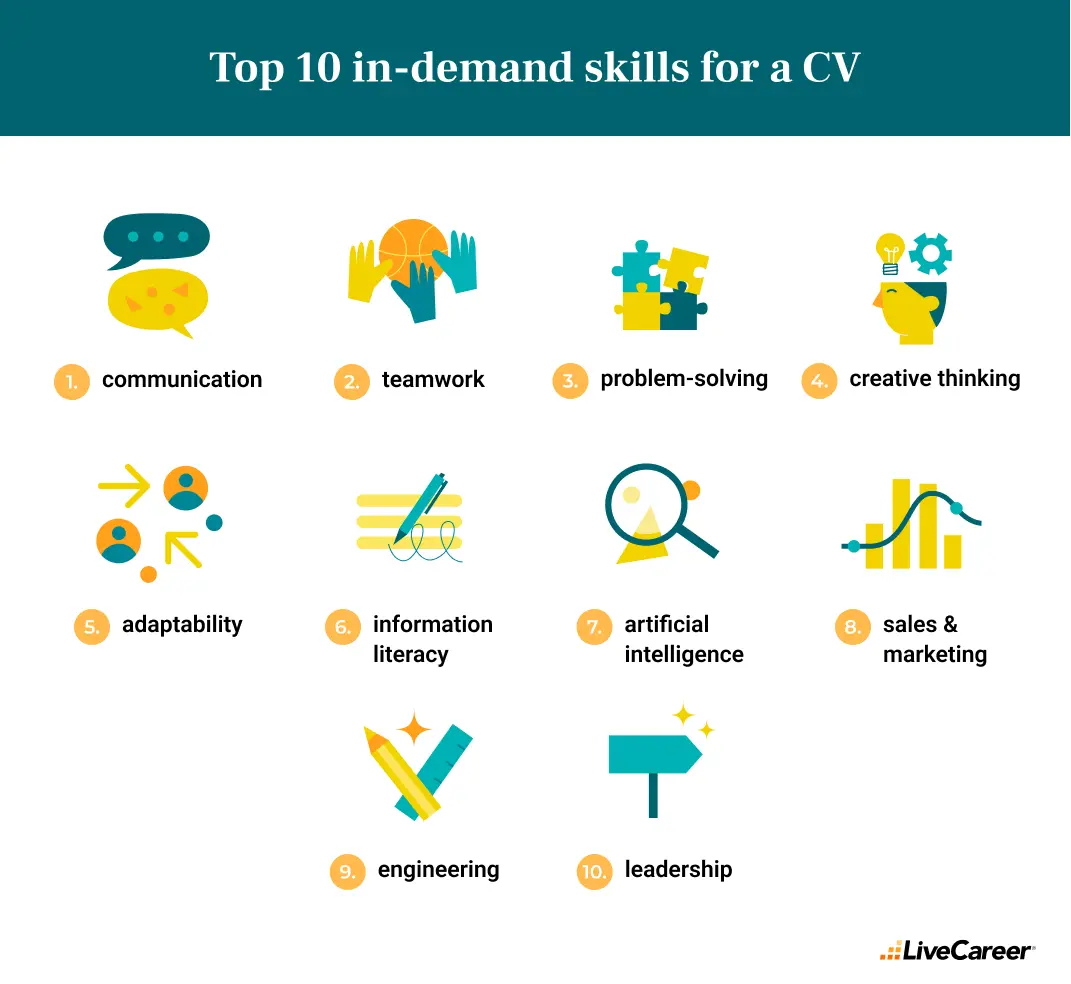
If you possess any of these highly coveted skills, it’s often a great idea to include them on your CV, even if they’re not explicitly mentioned in the job posting. Here is a more in-depth look at these top job skills:
As a cornerstone employability skill, communication supports everything from leadership to collaboration and client success. Effective communication, the successful exchange of information and ideas, remains a cornerstone competency for nearly every professional role. It is an umbrella term that encompasses a vast range of sub-skills like:
Communication skills can also be divided into three larger types: verbal, non-verbal, and written. All play important roles in almost every field and career level.
The modern workplace increasingly relies on practical teamwork skills. These skills involve working productively with others, contributing to group goals, and valuing diverse perspectives and backgrounds. They include the ability to facilitate discussions and co-create solutions.
Strong communication, particularly active listening and empathy, underpins successful collaboration. Increasingly, collaboration skills also include the ability to work together with AI systems and digital tools.
Effective problem-solving is a fundamental skill that enables you to navigate challenges and find solutions. It involves analysing situations, identifying the root cause of issues, and implementing effective remedies.
Strong problem-solving skills are highly sought after in every industry, as they directly contribute to organisational efficiency and innovation. They also pair up very nicely with a multitude of other interpersonal skills. All kinds of manager CVs greatly benefit from problem-solving skills.
Creative thinking emerges as a consistently top-ranked skill for the future workforce, extending far beyond artistic expression. It represents a fundamental human capability essential for innovation, adaptation, and value creation in an increasingly complex and automated world.
Creative thinking is intrinsically linked to organisational success by directly contributing to innovation, complex problem-solving, and identifying new market opportunities, efficiencies, or strategic directions. Fostering environments where creative thinking thrives can lead to higher rates of innovative ideas and better project outcomes.
In a world characterised by unprecedented volatility, uncertainty, complexity, and ambiguity (VUCA), a cluster of CV skills centred around adaptability, resilience, decision-making, and self-management has become critically important. These are among the top skills for remote workers, who must take ownership of their productivity and career development without direct supervision.
Traditional models of stable, long-term employment within a single organisation are diminishing. Instead, people are increasingly expected to take ownership of their career paths and continuous professional development, navigating a more fluid landscape characterised by project-based work and potentially shorter tenures. This requires a self-directed skill acquisition and career management approach to maintain relevance and employability.
Information literacy is about knowing how to find, evaluate, understand, and use information effectively—and doing so in an ethical way. Whether researching online, interpreting reports, or making data-based decisions, being information literate means you can confidently tell what’s credible, relevant, and accurate. With so much content, including misinformation, it’s a key skill for everyday life and professional success.
But information literacy isn’t just about spotting fake news or doing research. It’s closely linked to other critical skills like thinking analytically, solving problems, and making data-driven decisions. In many roles, understanding data—how to find it, interpret, and present it clearly—is essential.
As artificial intelligence (AI) becomes more common in the workplace, it’s essential for everyone, not just tech experts, to understand how to work with it. This starts with AI literacy, which includes knowing the basics of how AI and digital tools work, what they can and can’t do, and how they apply to different jobs.
To work well alongside AI, people must develop skills that AI can’t easily replicate, like critical thinking, emotional intelligence, creativity, and strong communication. While AI might lower the barrier for specific tasks, it also raises the bar for others, making it crucial for education and training programs to help people grow their uniquely human abilities in tandem with technical skills.
Sales and marketing skills are all about understanding customers and delivering value, and these skills have constantly changed along with the progressing digitisation of the world. Traditional concepts like the marketing mix are still relevant, but today's marketers need a mix of skills for a CV like:
Sales have evolved, too, shedding old-school, pushy tactics in favour of a more consultative and collaborative approach. Building trust, understanding client needs deeply, and offering tailored solutions are now central. Importantly, marketing and sales are now more connected than ever, sharing tools and insights, and focusing on the full customer journey from awareness to loyalty.
Engineering is a very vast term and encompasses hundreds of trades and skills. At its core, engineering skills are all about applying maths and science with sound judgment to design and create practical solutions. Engineers develop systems, structures, and technologies that must meet specific needswhile balancing cost, safety, sustainability, and ethical constraints.
The specific engineering skills depend on the position you’re pursuing. Whether you’re an architect, weaver, carpenter, or aeronautical engineer, you must showcase engineering skills on your CV.
As organisations become flatter and more collaborative, traditional command-and-control styles give way to:
Team leaders and managers must improve their leadership skills and adapt their leadership styles to ensure that all employees feel valued, listened to, respected, and motivated.
Hard skills include measurable abilities like proficiency with software or technical knowledge, but they also encompass project management skills such as planning, scheduling, and risk management. These quantifiable skills can be demonstrated through certificates, degrees, or assessments.
On the other hand, soft CV skills focus on non-technical attributes related to how you work and interact with others. Examples include communication, teamwork, adaptability, and problem-solving. Unlike hard skills, soft skills are more abstract and often tied to your personality.
When selecting the key skills to put on a CV, you must consider both groups. Choose them by analysing the job posting and selecting the skills mentioned the most, or marked as essential. These CV skills are your CV keywords necessary to create an ATS-compliant CV.
Emerging skills are new or increasingly essential abilities that are gaining prominence due to technological changes, the economy, society, and work. These skills often arise as a response to innovation, automation, digitisation, and global challenges.
These key CV skills are vital for newly forming jobs and can significantly impact your current position. Here are the top 8 hard and soft skills to put on a CV considered emerging by the World Economic Forum 2025 report.
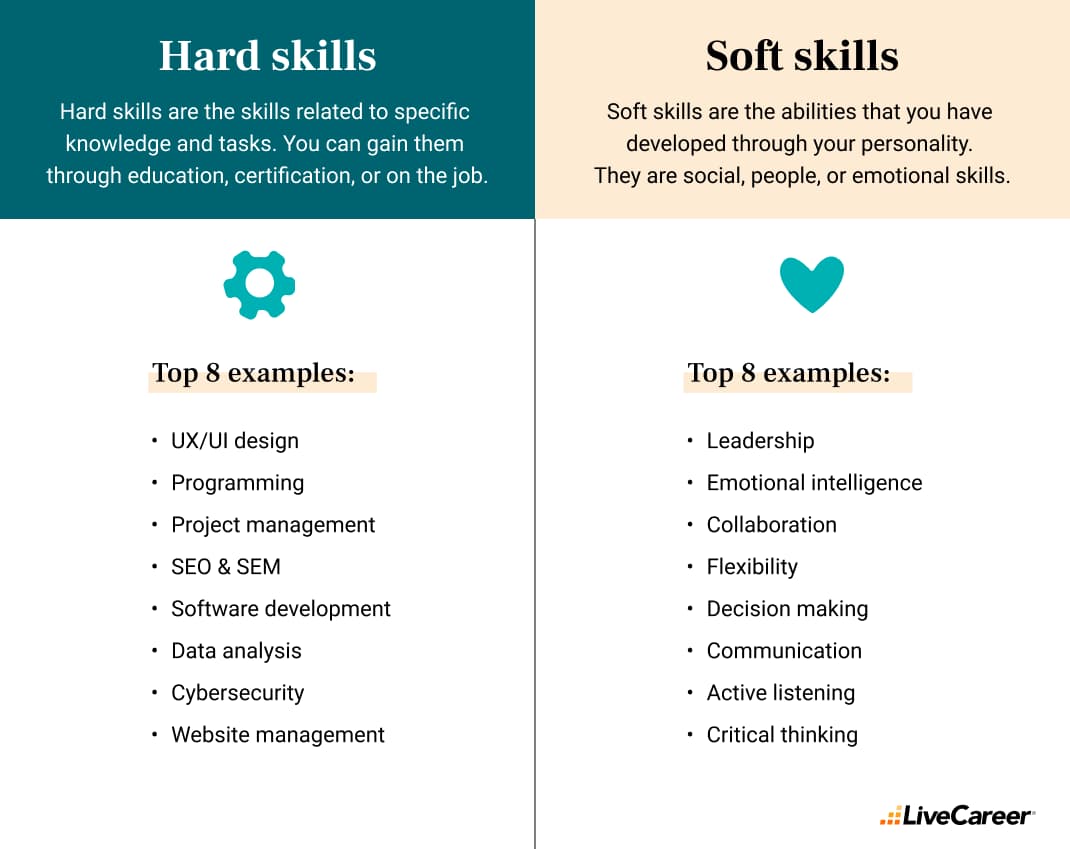
Like I said earlier, these important skills for a CV impact a variety of job positions and industries. The top 10 industries predicted to be impacted by the need for emerging skills are:
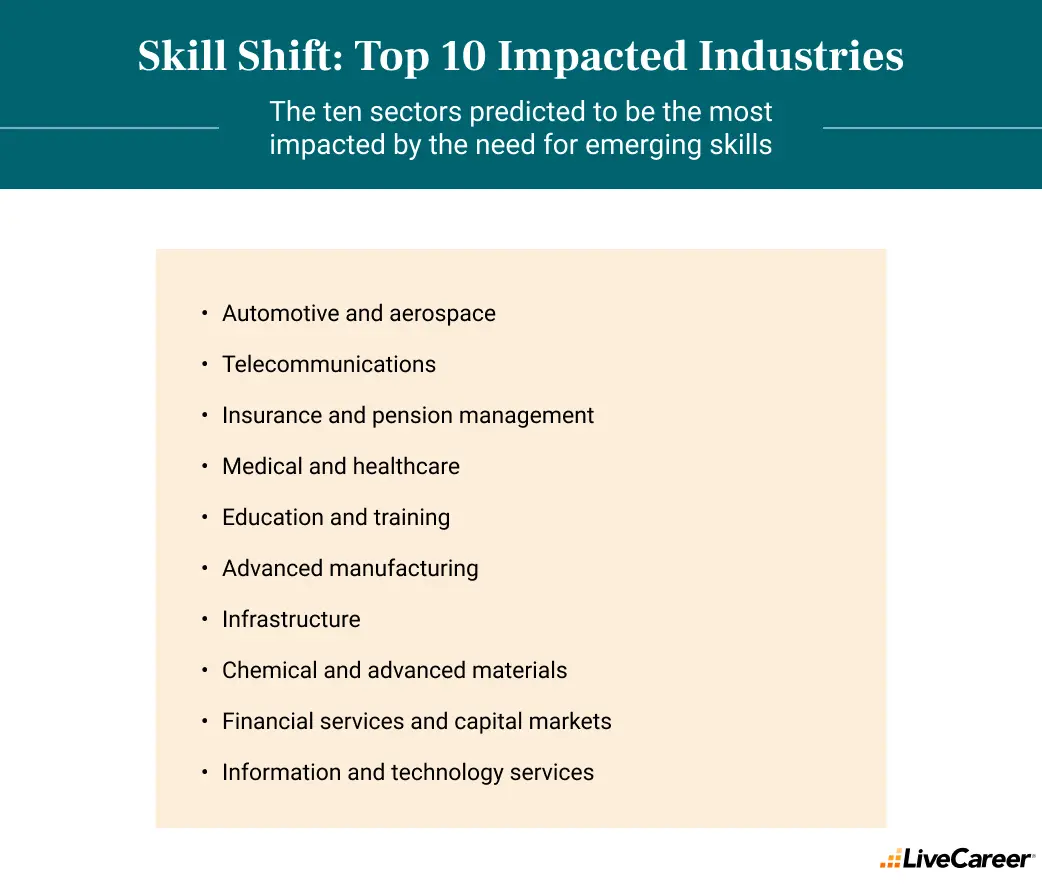
To get into or grow in these industries, you must show strong proficiency in these up-and-coming CV skills.
A strong CV summary will convince the recruiter you’re the perfect candidate. Save time and choose a ready-made personal statement written by career experts and adjust it to your needs in the LiveCareer CV builder.
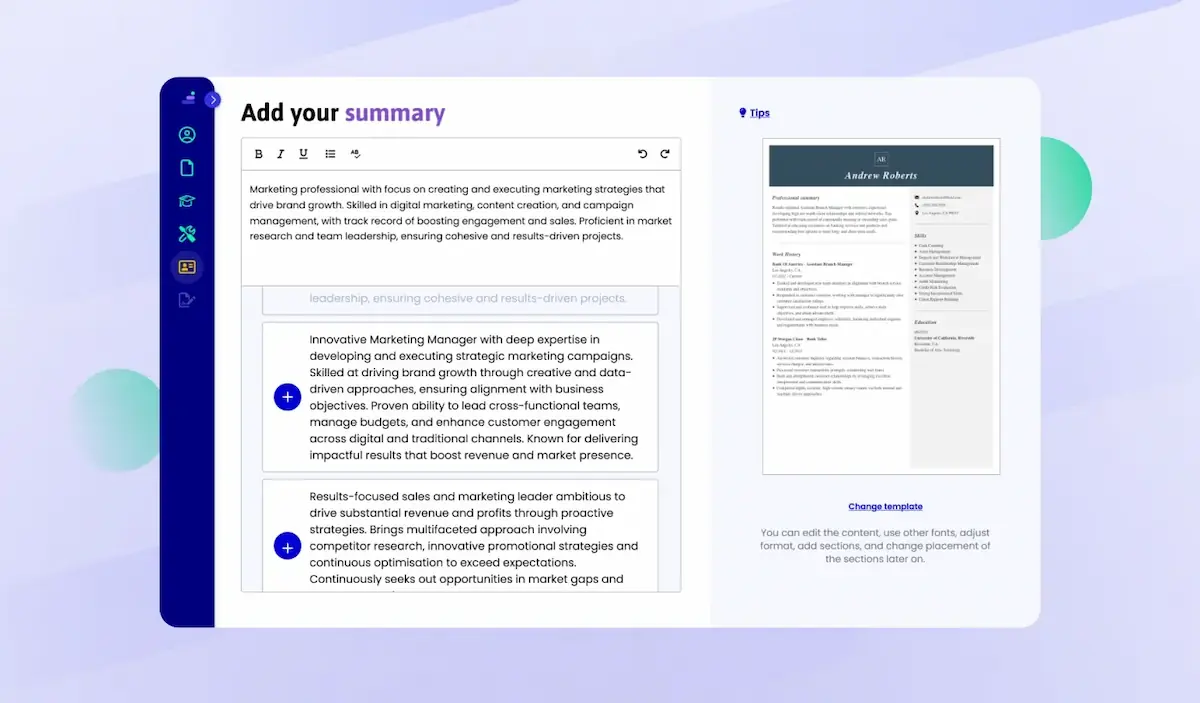
Every time you apply for a job, you should adjust your CV to tailor it to the specific job requirements. Using the same generic CV for every application won’t do you any favours. Luckily, choosing the right skills to add to a CV is easy. Just follow my lead:
All you need to do is refer to the job advert and note all the skills it mentions. Then, consider your own skills and see what matches the job requirements. Ensure you also consider transferable skills and any other industry-specific skills the job advert doesn’t mention.
Start by thinking about what you’re good at—both the skills you enjoy using and the ones others rely on you for. Look at your hobbies, past challenges you’ve solved, and courses or training you’ve excelled in. These can all reveal skills worth including on your CV.
Also, ask for feedback from people who know how you work. They might spot skills you’ve overlooked. And if people often come to you for help with specific tasks, that’s another clue. Once you’ve got a clear picture, highlight the CV skills that match the job you’re applying for, starting with the skills section.
You want to pick 5–10 of your best skills in your CV skills section. To make them more impactful, provide a short sentence explaining how you demonstrate that skill. See this example:
Doing so is especially important when creating a skills-based CV(also known as a functional CV) as it makes your skills the most important section. Provide a quantified CV accomplishment for as many of your CV skills as possible. This approach will generate the most impact on the recruiter. If it’s your first CV, expanding on your skills can cover for the lack of work experience.
But that’s not the only place where you should feature your skills. To write a CV chock-full of valuable CV skills, showcase them in the other parts of your CV.
Depending on your experience level, you can include skills in your CV profile, also known as your CV summary or CV objective.
Including a couple of relevant skills in the introduction to your CV is a great way to hook the hiring manager and convince them to keep reading. Here’s an example of how to incorporate customer service skills into your CV summary:
Customer-focused Store Manager with over 7 years of retail leadership experience. Known for leading by example and fostering strong team engagement. Successfully improved customer satisfaction scores by 20% in one year by implementing new training programs and streamlining in-store service procedures. Now seeking to bring strong leadership and customer-centric strategies to Company XYZ.
As the most critical section of the most popular CV format, you should use your work history to include more evidence of your skills. It’s the perfect place to show how your CV skills have yielded quantifiable results.
Here are a few sample bullet points from a CV work experience section that do exactly that:
Tesco Express, London
May 2020–December 2024
This example shows the candidate's leadership, customer service, sales performance, inventory management, and merchandising skills.
If you’re writing a student CV or a graduate CV, you can use your CV education section as an additional place to put skills on your CV. Without a professional work history, it’s an ideal way to show off your abilities.
Simply add one or two bullet points highlighting relevant coursework or extracurricular activities demonstrating your hard or soft skills. Here’s how your CV could look:
BA (Hons) Business and Retail Management
University of Westminster, London
Graduated: 2015
Relevant Coursework: Principles of Marketing, Consumer Behaviour, Retail Operations and Supply Chain, Leadership and Team Management
Thesis:“Enhancing Customer Loyalty in Urban Convenience Retail: Strategies for Long-Term Engagement”
This example shows CV skills like customer relationship management, retail operations, leadership, marketing, analytical thinking, and financial planning skills.
When it comes to bonus sections, the world is your oyster. A language section is an obvious one, but you can also provide evidence of your skills in a hobbies and interests section. A well-known example is team sports, which demonstrates teamwork and leadership skills.
You could also include projects or certificates on your CV.There are many ways
to demonstrate your skills in additional CV sections. Here’s an example:
Certifications
Publications
Languages
And that’s how to incorporate skills in your CV. As you can see, CV skills are a large part of a successful job application. This also made us curious about what skills our users add to their CVs.
After reviewing 6 million CVs created using our builder, we identified the top 10 most commonly included skills overall*:
*The data comes from a period of the last 12 months (August 2023-August 2024).
Your CV skills don’t all have to come from the workplace. Some of the strongest, most transferable abilities are developed in everyday life, volunteering, or even hobbies. Here's how to grow and recognise the key skills for your CV, no matter where you're starting from.
One of the best ways to build skills to put on a CV is by diving into hands-on experience. Whether you're volunteering, freelancing, or starting a small side project, real-world situations help you sharpen abilities like teamwork, organisation, or problem-solving—some of the most sought-after skills for CVs across industries.
Not all CV skills come with a certificate. Think about challenges you’ve overcome, systems you’ve streamlined, or people you’ve supported—these experiences reveal valuable strengths. You might be a great communicator from leading a club, or you’ve honed your time management by juggling work and study. These are all good skills for a CV.
Upskilling doesn’t always mean going back to school. Online courses, workshops, and tutorials are fantastic for building key skills for a CV, like digital tools, leadership approaches, or creative thinking techniques. Continuous learning shows initiative, which is always a great signal to employers.
Sometimes others can spot your strengths more quickly than you can. Ask colleagues, mentors, or friends what they think you’re great at. This feedback can reveal skills to put on your CV that you hadn’t considered, and give you language to describe them more confidently.
Stepping into unfamiliar roles or situations helps you grow. Whether speaking at an event, joining a committee, or leading a new task, putting yourself in new environments strengthens adaptability, leadership, and initiative—standout skills for any CV.
There are hundreds, if not thousands, of skills you can include on a CV. In the beginning I gave you the current top 10 CV skills employers want and need. Now, I'll show you some additional skills and skill groups you may want to invest in and focus on your CV.
People skills, often referred to as interpersonal skills, are essential for building positive relationships with others in the workplace. These include the ability to communicate effectively, empathise, and engage with colleagues, clients, and customers. Whether you’re managing a team, dealing with customers, or collaborating with colleagues, strong people skills are key to creating a positive work environment and fostering teamwork.
People skills encompass both verbal and non-verbal communication, emotional intelligence, and the ability to manage conflict or differences in opinions. When adding people skills to your CV, consider using examples that demonstrate your leadership or customer service experience.
Administrative skills are foundational to most office-based roles. These skills include organising schedules, handling correspondence, and ensuring smooth day-to-day operations. Being proficient in administrative tasks shows that you are reliable, organised, and able to manage time efficiently. Data entry, filing, and calendar management are just a few examples of administrative responsibilities that are crucial for maintaining operational flow.
When listing administrative skills on your CV, be specific about the tools and systems you’ve worked with, such as Microsoft Office, Google Suite, or any CRM software.
Although, mostly associated with bonus sections, language skills are without a shadow of a doubt, skills. Whether you're multilingual or proficient in a single second language, the ability to communicate in more than one language opens up more opportunities. Employers value language skills as they enable better communication with international clients, partners, and customers.
On your CV, list the languages you speak and your level of proficiency, such as fluent, conversational, or basic. If you’ve used language skills in a professional context, such as translating documents or conducting meetings, make sure to highlight this experience.
Organisational skills demonstrate your ability to manage multiple tasks efficiently and stay on top of deadlines. These skills are important in nearly every role, whether you’re managing projects, coordinating teams, or handling day-to-day administrative work. Organisational skills include time management, prioritisation, and delegation.
To showcase these on your CV, provide examples of times when you successfully coordinated events, managed competing priorities, or organised a large-scale project. Tools like project management software or task prioritisation techniques are also important to mention if you’ve used them.
Digital skills are crucial in the technology-driven field. These skills range from basic computer proficiency (e.g., using office software) to more advanced abilities like data analysis, programming, or social media management. As businesses increasingly rely on digital tools and online platforms, proficiency in digital skills is essential to staying competitive.
On your CV, highlight the digital tools or software you’re skilled in, such as Microsoft Excel, Google Analytics, Salesforce, or Adobe Creative Suite. These specific tools will demonstrate your technical proficiency and adaptability.
Conflict resolution skills are vital in workplaces where differing opinions and ideas naturally arise. These skills involve negotiation, mediating disputes, and finding common ground between conflicting parties. Strong conflict resolution skills enable you to maintain positive relationships, reduce tension, and ensure smooth communication between teams or clients.
To highlight these skills on your CV, provide examples of times when you helped resolve disputes or facilitated a difficult conversation that led to a positive outcome.
Negotiation skills are essential in roles that involve buying, selling, or collaborating with others. The ability to negotiate effectively ensures that both parties feel heard and that agreements are reached fairly and efficiently. Whether negotiating contracts, project timelines, or salaries, negotiation is about finding mutually beneficial solutions and navigating difficult conversations with professionalism.
On your CV, provide examples where you successfully negotiated deals, handled client expectations, or resolved disagreements, particularly when quantifiable results were achieved, such as cost savings or improved terms.
IT skills are no longer a luxury—they are a necessity in most roles. From basic tasks like using word processors and email platforms to more advanced skills like coding, networking, and data analysis, strong IT abilities will help you succeed in nearly any job. Being comfortable using technology can significantly improve your efficiency and productivity.
When listing IT skills on your CV, specify your proficiency with tools such as Microsoft Office, cloud-based software, or more specialised skills like Python or SQL. Be sure to include any relevant IT certifications as well.
You don’t have to be a CV writing expert. In the LiveCareer CV builder you’ll find ready-made content for every industry and position, which you can then add with a single click.

Looking to elevate your CV to new heights? See these articles:
Thanks for reading this article about the top skills for a CV.
*Data was collected from July 2023 to June 2024.
Our editorial team has reviewed this article for compliance with LiveCareer’s editorial guidelines. It’s to ensure that our expert advice and recommendations are consistent across all our career guides and align with current CV and cover letter writing standards and trends. We’re trusted by over 10 million job seekers, supporting them on their way to finding their dream job. Each article is preceded by research and scrutiny to ensure our content responds to current market trends and demand.
Ideally, you should aim to include 5–10 relevant skills in your CV skills section. However, you can add more in other sections of your CV. Aim for 10–20 skills total. Provide a mix of hard skills and soft skills.
Your cover letter should include several skills. You don’t need to list these skills as bullet points, but you should weave 2–6 of your key strengths while showcasing your professional backstory.
When you're just starting out, the best skills to include are those that show you're adaptable, eager to learn, and ready to contribute. Some excellent entry-level CV skills include:
Yes, if the job calls for specific tools, platforms, or software expertise, having a dedicated “Technical skills” section is a great idea. This helps recruiters quickly identify your tech-savviness, especially in IT, engineering, marketing, or design roles.
Category: CV Help
Crafting a job-winning CV is all about showcasing your unique skills and experiences. Start with a strong personal statement that highlights your career goals and achievements.
Try Our CV Builder Now